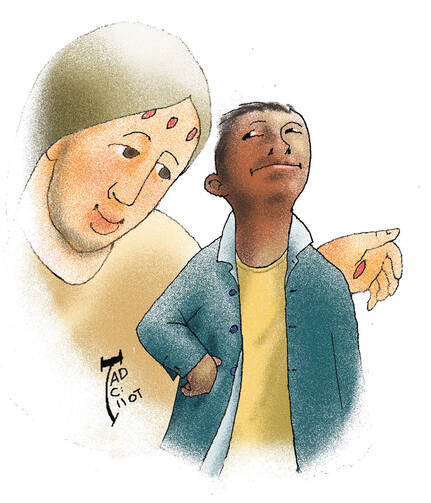Gospel: Welcome Sinners
A tension in the church today mimics a tension Jesus felt with the religious experts of his own day: Why did Jesus welcome sinners without asking for a change or transformation, a turn away from their sin? Some Catholics sense something similar going on with Pope Francis. Why does Francis seem to water down the faith, welcoming in those who seem at odds with the teaching of the church? Jesus did, of course, ask sinners to stop sinning, as does Pope Francis; but there is something deeper at work regarding the complaints of those who arrayed themselves against Jesus’ behavior. The deeper question is straightforward: Why does he not notice how righteous we are?
When the sinning woman crashed Simon the Pharisee’s dinner party, Simon was taken aback: “If this man were a prophet, he would have known who and what kind of woman this is who is touching him—that she is a sinner.” The flip side of defining this woman as a sinner is the implicit claim that Simon does not consider himself a sinner.
Jesus’ lavish acceptance of the woman known as a sinner is essential for each of us because everyone, Simon included, is a sinner. If Jesus were to reach out only to the people who were worthy of God’s forgiveness, no one would find an outstretched hand. It is we who define ourselves as “worthy” by creating distinctions between those whom we consider “real” sinners and those whom we judge basically “righteous,” which generally includes me and those like me. But no matter how worthy we consider ourselves, God sees all of us as we are and is aware of our great need for forgiveness. To be forgiven is to acknowledge our own sin, not that of someone else.
Repenting of our sins, though, is the beginning of the process of being Jesus’ disciple, not the end. Perhaps after her encounter with Jesus, the sinning woman became known as “the woman formerly known as the sinner,” which would be nice for her, but neither she nor we ever stop being sinners during our earthly sojourn. Frustrating as it is, even in the light of God’s great forgiveness, we all remain sinners.
Jesus tells all of us to go “and from now on do not sin again” (Jn 8:11), as he told the woman accused of adultery, but we do sin again. As a result of our stumbling along the way, we must cultivate the same constant, searching need to recognize Jesus as the one to whom we must always turn, the one who has gained us salvation from the sin that lurks and stalks us, the one who offers forgiveness from the depth of God’s mercy.
Since our salvation emerges from God’s mercy and God’s mercy, thankfully, never ceases, we are able to return to Jesus with tears and repentance over and over. In the Catechism of the Catholic Church we learn that the sacrament of reconciliation, also known as the sacrament of forgiveness, allows those who participate to “obtain pardon from God’s mercy for the offense committed against him” (No. 1422). In baptism we have become “justified in Christ”; “nevertheless, the new life received in Christian initiation has not abolished the frailty and weakness of human nature, nor the inclination to sin that tradition calls concupiscence, which remains in the baptized such that with the help of the grace of Christ they may prove themselves in the struggle of Christian life. This is the struggle of conversion directed toward holiness and eternal life to which the Lord never ceases to call us” (No. 1426).
God is never done with us, though we might sometimes feel done with ourselves, especially when “in our effort to be justified in Christ, we ourselves have been found to be sinners.” Faith in Christ is not a one-time event, however, but a sustained growing in holiness. The Christian life is marked not just by sinful stumbling along the way but by getting up, dusting ourselves off and walking home to Christ as often as we need to repent. And when we walk into the house to encounter Jesus, we receive the same acceptance that the sinful woman did: a welcome home.
This article also appeared in print, under the headline “Welcome Sinners,” in the June 6-13, 2016, issue.








